DeSantis Slams Biden For Prioritizing Iran Over Israel
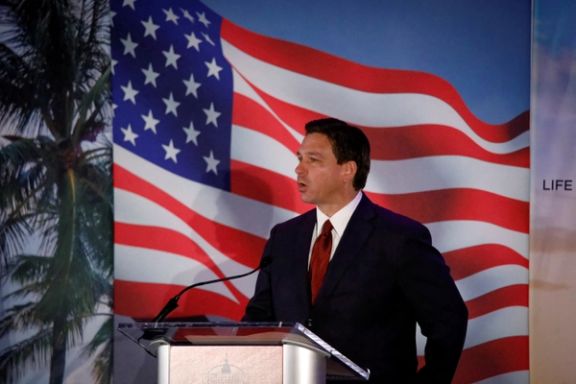
Republican presidential candidate Ron DeSantis has criticized the Biden administration over its Iran policy, vowing a stronger posture against the clerical regime.

Republican presidential candidate Ron DeSantis has criticized the Biden administration over its Iran policy, vowing a stronger posture against the clerical regime.
DeSantis, presumed to be Donald Trump’s main competitor on the path to the 2024 Republican nomination, told Israel Hayom Thursday that the current administration is “more interested in kowtowing to Iran than standing by our allies,” describing US-Israel relationship under President Joe Biden as “disgraceful.”
“My view as president would be we're going to have a really strong US-Israel relationship,” said DeSantis, who announced his presidential bid in May and polls show that he currently has the best shot at beating Trump in the fight over his party's nomination.
Accusing the administration of prioritizing Iran over Israel, he said “You can't try to cozy up to them (Iranians). "So we would be supportive of Israel's predicament. And obviously, we would have a much stronger posture against Iran."
The Biden administration is reportedly discussing an unwritten deal with Iran to release money in exchange for limited concessions by Tehran.
“The whole Obama-Khamenei deal [2015 JCPOA nuclear agreement] was a total disaster and Biden is trying to resuscitate,” he said, highlighting that concessions to the Iranian regime means more money used to foment terrorism.
He vowed to squeeze the Islamic Republic so that the regime understands that pursuit of terrorism “is going to be bad for them economically, diplomatically, and potentially even militarily. “That is the way the only thing that the mullahs understand – strength," he underlined.
“Iran represents an existential threat to the State of Israel. Now they would love to wipe Israel off the map. They would love to wipe out America,” he added.
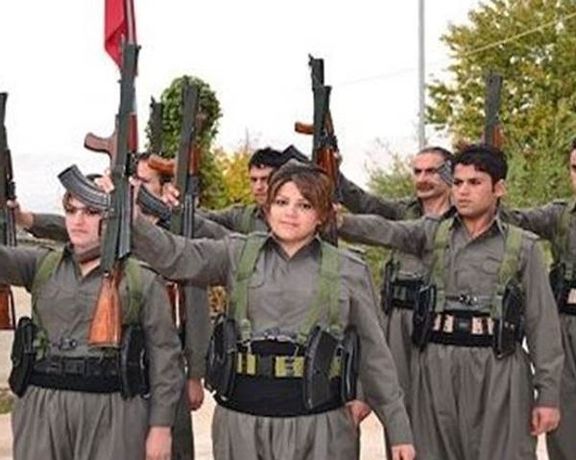
Clashes between two Kurdish parties in Iran left at least two dead and three wounded.
Following the collapse of the alliance between the Organization of the Toilers of Kurdistan and the Komala Party of Iranian Kurdistan, an armed conflict occurred between their Peshmerga forces on Thursday morning, reported Hengaw Human Rights Organization.
The Komala Party announced on Wednesday that the efforts for an alliance have failed, and they will continue their activities independently.
Sources told Iran International the security forces of the Iraqi Kurdistan region entered their camps and ended the conflict.
In a tweet, Hengaw called on the two parties to "stop the military conflict and plan for an immediate mechanism to hold negotiations and end the disputes."
The human rights organization also expressed readiness "for any mediation to resolve disputes peacefully."
Rudaw Kurdish news agency reported the conflict took place in the Zargawez in the Kurdistan region of Iraq.
The Islamic Republic had previously called for the implementation of the security agreement with Iraq to prevent the activities of Iranian Kurdish parties in the Kurdistan Region of Iraq.
Komala has been engaged in guerrilla warfare against the Iranian government, notably during the 1979 Kurdish rebellion and the Iran–Iraq War.
The Organization of the Toilers of Kurdistan, also known as the Komala Reform Faction, is an armed communist and separatist ethnic party of Kurds in Iran based in northern Iraq. It split from the Komala Party of Iranian Kurdistan in October 2007 over internal disagreements but reunited with them in November 2022.
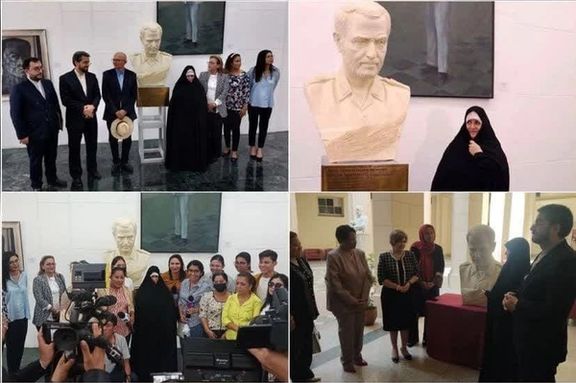
As part of the regime’s propaganda, two busts of the former IRGC Quds Force Commander Qasem Soleimani were erected in Cuba and Nicaragua.
During the recent trip of Ebrahim Raisi to Latin America, two figurines of Soleimani were unveiled by the wife of the President of the Islamic Republic of Iran, Jamileh Alamolhoda, in the two countries, Tasnim News Agency reported Thursday.
On January 3, 2020, the US military, on the order of President Donald Trump, killed Soleimani in a drone strike near Baghdad International Airport, saying that he had been "actively developing plans to attack American diplomats and service members in Iraq and throughout the region."
One of the busts was placed in the Hall of Heroes of Nicaragua in the presence of the Ministers of Culture, Family and Science, and another one the University of Havana with the Head of the Communist Party of Cuba and the Dean of the University of Havana attending the ceremony.
“Soleimani was a man of action and a hero in the fight against terrorism for the women of the region and a harbinger of security for the whole world,” said Alamolhoda on the sidelines of the ceremony.
On Saturday, Saudi Arabia's Foreign Minister Prince Faisal bin Farhan refused to hold a joint presser in Iran under Qassem Soleimani’s picture and the presser was relocated.
The Qods Force under Soleimani became deeply involved in the conflicts in Syria and Iraq, setting up militant proxy militias.
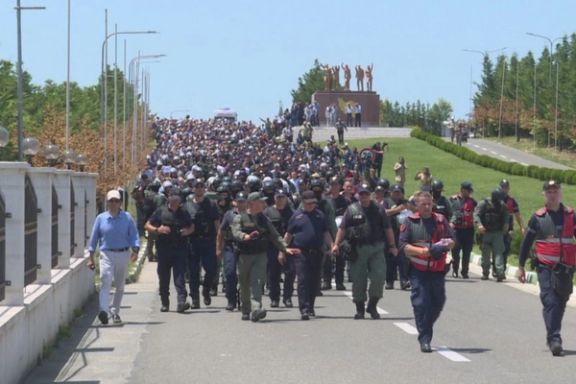
A collective of Iranian republican opposition groups has called for a probe into the Albanian police raid on Mojahedin-e-Khalq's exile center, Camp Ashraf.
The statement from the Union for Secular Republic and Human Rights in Iran, demanded that Western countries not ignore the standards of human rights in their dealings with the Islamic Republic.
The statement came two days after opposition group Mojahedin-e-Khalq (MEK) said hundreds of Albanian police officers raided their compound known as Ashraf-3, near Manze, a small hill town some 30km west of Albania’s capital Tirana.
The opposition coalition expressed concerns about the possible cooperation of European countries with the Islamic Republic in exchange for concessions from the regime, saying that the attack on the MEK’s township is in line with Iran’s intensified efforts to stifle voices of dissent inside the country and abroad.
The group said this trend is proven by the prisoner swap between Iran and Belgium that led to the release of Iranian diplomat convicted of terrorism Assadollah Assadi in exchange for four European nationals held hostage by the regime.
“The free world cannot contribute to the spread of democracy in the world by ignoring the freedoms and rights of citizens within its own territory, even on the pretext of security concerns,” the group's statement urged, seeking the formation of a fact-finding committee to investigate the incident.
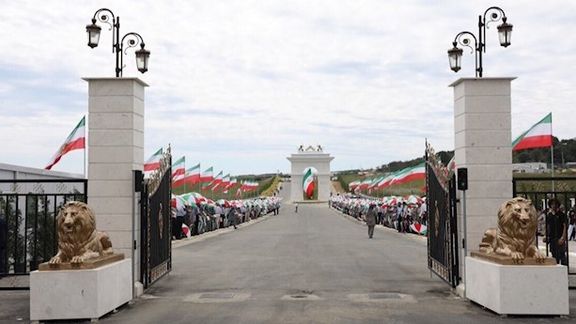
Reports about the circumstances of the incident at Camp Ashraf are full of conflicting recounts with the Albanian authorities blaming the MEK members for the clashes and the MEK accusing Albania of giving in to the whims of the Islamic Republic. Iranian Foreign Ministry Spokesperson Nasser Kanani said on Wednesday that the cult – as the regime calls the MEK -- is and will be a danger for its host country “due to its terrorist nature.”
The regime alleges that since the establishment of the Islamic Republic in 1979, the group has carried out numerous terrorist attacks against Iranian officials and civilians, killing some 17,000 people.
Also on Wednesday, Iran's vice president for legal affairs, Mohammad Dehghan, said legal measures are underway in coordination with the ministries of intelligence and foreign affairs as well as the judiciary to return “the hypocrites” to Iran. Iranian officials always refer to the exiled MEK with an Arabic term (munafiqin) that means 'hypocrites.'
“We must issue sentences for people who committed crimes against people or state property inside the country and enforce these verdicts abroad," he said.
Albania says the police were following a lead as part of an investigation over cyberattacks against the Albanian government, but the residents of the camp resisted the forces, and scuffles broke out.
The group said on Tuesday that one of their members, identified as Ali Mostashari, was killed and more than a hundred others injured, with some hospitalized in critical condition after police raided the camp using tear gas and pepper spray.
Albanian Interior Minister Bledi Cuci and the head of the national police, Muhamet Rrumbullaku, said 36 people – 15 police officers and 21 MEK members -- were injured during the raid, emphasizing that the death was not caused by any police action. Police denied any wrongdoing.
Albanian prosecutors have also charged six members of the MEK following the clashes for offenses related to the violation and destruction of police vehicles, disobeying police and court orders, as well as assault and battery of on-duty police officers. In a statement released on Thursday, the National Council of Resistance of Iran (NCRI) claimed that these six people – without identifying them – were the ones cooperating with the police and were trying to calm the situation.
Evidence revealed the MEK was informed beforehand about the police check, as was claimed by the Albanian authorities. However, according to the statement, the police showed up at the camp with 150 cars and over 1,200 forces. It added that after entering the camp, the police stationed machine guns on top of the buildings.
In a joint conference after the raid, Cuci and Rrumbullaku said that about 100 computers were seized during their searches as well as documents which, at the time of the operation, the MEK members tried to burn. The police released drone footage of MEK members moving big black bags of what they say were documents to an outdoor fireplace and trying to burn them.
Confirming some of the accounts in the NCRI statement, they said that they had a meeting with the six main leaders of the camp and were promised full cooperation. However, they said the resistance began after about two hours of search when the police found out about the MEK members' efforts not to declare server rooms and computer equipment in almost 17 facilities.
Following the incident, the US State Department released a statement, saying that it has been "assured" the Albanian government did not violate any human rights. Raising concerns about the group’s actions against its own members, including allegations of abuse, the statement emphasized that Washington does not view the MEK as “a viable democratic opposition movement that is representative of the Iranian people.”
In September 2022, Albania severed its relations with the Islamic Republic and expelled all Iranian diplomats and embassy staff following an investigation into a large-scale cyberattack that targeted the country’s infrastructure in July. The attack happened around the time of a conference held by the MEK.
The Tuesday attack against the de facto headquarters of the MEK took place about a month after the MEK-affiliated hacktivist group Uprising till Overthrow breached into 120 servers of the Iranian presidential office, getting access to internal communications, meetings minutes, and leaking troves of confidential data.
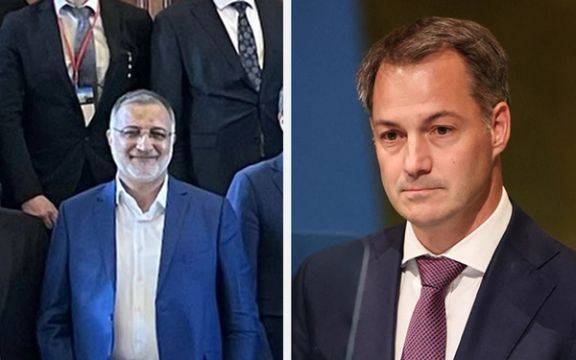
Belgian lawmakers Wednesday questioned PM Alexander De Croo and Foreign Minister Hadja Lahbib for allowing officials from Iran and Russia to attend a mayors' convention in Brussels last week.
Lahbib especially is under scrutiny for having approved visas requests while Iran and Russia are under international sanctions and only three weeks after Belgian NGO worker Olivier Vandecasteele was released from an Iranian jail. He was exchanged in a controversial move with a former Iranian diplomat convicted in a Belgian court of leading a terror plot in Europe and serving a long prison sentence.
De Croo and Lahbib said they didn't want to risk a diplomatic row with Iran close to the release of Vandecasteele and three other Europeans, but lawmakers from opposition as well as coalition parties contest that reasoning.
When in Brussels, the Iranian delegation filmed Belgo-Iranian lawmaker Darya Safai and Iranian opposition members, Belgian national broadcaster RTBF reported.
Safai, who was a prominent activist in Iran before fleeing to Belgium in 2000, said she no longer felt safe in Belgium.
Tehran' mayor, Alireza Zakani, is known as a hardline Iranian politician, who was a member of the Revolutionary Guard’s Basij militia.
The opposition has called for Lahbib's resignation, while extreme-right opposition party Vlaams Belang also asked for De Croo's resignation.
State secretary for external relations of the Brussels government Pascal Smet resigned on Sunday over the all-expenses paid trip.
Reporting by Reuters
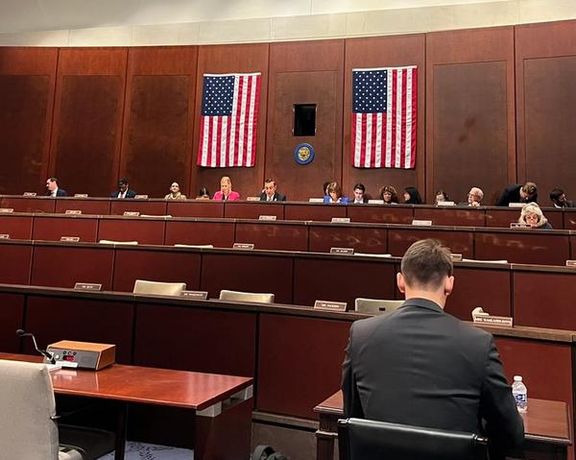
The Foreign Affairs Committee of US House of Representatives unanimously passed a resolution to make some punitive measures against Iran permanent.
The bipartisan bill called Solidifying Iran Sanctions Act of 2023, has the potential to make the 1996 sanctions against Iran – or several other measures -- permanent by deleting the 'sunset clause' in any action against the Islamic Republic, a provision that provides an expiry date for a measure.
The bill, now heading to a full vote on the House floor, strikes a section from the 1996 legislation that set 2026 as the sunset date, making permanent sanctions against the regime that are designed to slow down research and development of nuclear and biological weapons as well as preventing terrorist actions against Washington and its allies.
The 1996 law requires the imposition of sanctions with respect to Iran’s illicit weapons programs, conventional weapons and ballistic missile development, and support for terrorism, including Iran’s Revolutionary Guards Corps, read part of the bill.
"This bill takes the long overdue step of striking the arbitrary sunset from the Iran Sanctions Act, so that sanctions against the regime will only be lifted if Iran stops its threatening behavior," the House Foreign Affairs Committee chairman Rep. Michael McCaul (R-TX) said. Representatives Michelle Steel (R-CA) and Susie Lee (D-NV) helped bring political support for the Solidifying Iran Sanctions Act (SISA).
"By making these sanctions permanent, the US is signaling to Iran that we won't tolerate their continued aggression and to our allies that they must also increase their pressure on the [rogue] nation," Steel said.
"Iran’s evil regime has proven they cannot be trusted to negotiate in good faith," Steel told Fox news, adding, "Only through strength can we show the path to peace, end their brutal attacks on their own people, and prevent a nuclear Iran."
Lee said the bipartisan bill "is one step closer to becoming law and keeping Iran in check," adding, "Regardless of political party, Congress must stand firm against the Iranian regime’s brutal repression of its own people, its funding of terrorism abroad, and its reckless pursuit of nuclear weapons."
The 1996 sanctions are distinct from a series of sanctions that the Trump administration imposed in 2018 and 2019 against Iran's oil exports and international banking. However, Trump based his sanctions partly on the Iran Sanctions Act of 1996. Whether this can potentially hinder any attempts by the Biden administration to reduce the more recent sanctions in a deal with Iran is not clear.
In an interview with Iran International’s Arash Alaei, Representative Keith Self (R-TX) said, "We must deter Iran, first of all, in their nuclear program, as a nuclear war is not something you can even contemplate. And second, we must encourage the Iranian people to rise up against the regime."
Alaei says that Democrats are reluctant to comment on the measures against the Islamic Republic due to a lack of comprehensive Iran policy by the Biden administration.
Criticizing the Biden administration, Senator Kevin Cramer (R-ND) told Alaei that reports about impending deals to unfreeze the regime’s assets in Iraq or South Korea indicate that the administration is following a policy of appeasement with Iran, and “all the bad actors” like China, North Korea and Russia.
“What we shouldn’t do is weaken our position with Iran... we should we projecting strength,” he said.